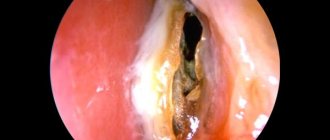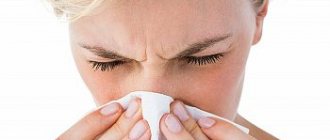It is in the later stages of pregnancy that women most often experience nasal congestion and runny nose. The statistics are eloquent: at 30 weeks, nasal obstruction is observed in 40% of pregnant women, at 40 weeks - in 42%. A runny nose during pregnancy in the 3rd trimester can be due to a variety of reasons. Treatment is selected individually.
Nasal congestion often appears before childbirth, sometimes 10-12 days before. In these cases, symptoms will most likely continue throughout labor and for a week or two after. All this is typical for the so-called hormonal runny nose. It may be associated with laryngopathy (sore throat and hoarseness), which is normal for women in labor, as well as decreased hearing and sense of smell.
On a note
It is wrong to say that a runny nose is a disease. It would be correct to say that this is just a set of symptoms that arise as a consequence of the disease - rhinitis. However, in common parlance they are considered to be synonyms.
Many women give birth safely in the presence of vasomotor rhinitis.
But these are not all the consequences that sneezing and nasal congestion can cause during pregnancy in the 3rd trimester.
Why is a runny nose dangerous in late pregnancy?
The danger lies in the possible effect on fetal development. If constant nasal congestion lasts more than a week, then the child does not receive enough oxygen and develops in hypoxic conditions. Because of this, there may be a lack of weight and, in severe chronic cases, underdevelopment of individual organs.
The earlier rhinitis appears during gestation and the longer it lasts, the more likely the risk of undesirable consequences for the fetus. A runny nose that appears a week and a half before birth has virtually no effect on the development of the fetus.
A runny nose in the last days of pregnancy does not in any way affect the health of the unborn baby.
Review
“I had a runny nose three times throughout my pregnancy, but all three times it went away very quickly. The first time was at week 12, but there I was just frozen. Then he was 28 weeks pregnant, I don’t even know why. It probably lasted three days, and when I went to the doctor, it had already disappeared. And the last time happened at 40 weeks, five days before giving birth. I read about such nasal congestion. But no, it passed. On the day of the trip to the maternity hospital, I still had nasal congestion in the morning, but in the chaos and getting ready, I didn’t even notice that it had gone away. And already in the maternity hospital, I didn’t even notice that he wasn’t there. The next morning after giving birth I was breathing normally. I never used any products, I just did inhalations with St. John’s wort and smeared Zvezdochka on my nose. In my opinion, this is like a poultice for the dead.”
Yulia, Petropavlovsk-Kamchatsky
The presence of ARVI in a pregnant woman is an indication for referral to the infectious diseases department of the maternity hospital.
Diseases accompanying a runny nose are also dangerous for the fetus. If nasal congestion occurs due to a cold, the infection can affect the fetus and lead to infection of the baby after birth. A general deterioration in the mother's condition due to a cold or acute respiratory infection can cause premature birth.
But even more dangerous are the medications that many women habitually take to treat rhinitis without consulting a doctor. During pregnancy in the 3rd trimester, most popular vasoconstrictors are strictly contraindicated: if they enter the body, they easily pass through the placental barrier and poison the fetus. The use of strong corticosteroids (most nasal drops contain them) or antihistamines can even lead to fetal poisoning or affect the labor activity of the uterus and the course of labor in general.
Taking medications before childbirth must be strictly coordinated with your doctor.
Review
“I had a runny nose at 32 weeks of pregnancy. He had a cold and a sore throat. I was treated only with folk remedies - I steamed my legs, did inhalations, and went to the sauna twice. She didn't take any medications. “Everything passed in 8 days, there were no consequences, and then the birth was completely normal.”
Angela, Ekaterinburg
Video: ARVI and colds in pregnant women
Why a runny nose may occur during pregnancy
A runny nose can darken the condition of almost every woman who is in an interesting situation. It is a pregnant woman who is more susceptible to acute respiratory infections than other people. And there is a completely logical explanation for this.
- Colds. The immunity of a woman carrying a child decreases, which makes her more susceptible to viral and infectious diseases.
- Changes in hormonal levels. Due to hormonal changes and increased production of progesterone and estrogen, swelling of the nasal mucosa occurs, causing the woman to feel stuffy.
- Drying of the nasal mucosa during pregnancy. Firstly, this occurs due to an increase in the amount of blood in the body. Secondly, the cause of trouble may be insufficient air humidity or the presence of allergens in it.
- Chronic diseases of the nasopharynx existing even before pregnancy - deviated septum, sinusitis, adenoids. They can worsen during pregnancy. That is why it is important to visit an otolaryngologist at the planning stage.
Causes of nasal congestion and sneezing in the 3rd trimester
As in other stages of pregnancy, in the 3rd trimester sneezing and nasal congestion can be caused by many reasons. However, according to statistics, the leading one among them is the effect of the release of hormones on the condition of the nasal mucosa. With such a hormonal runny nose (in otolaryngology it is simply called rhinitis of pregnant women), only swelling of the mucous membrane is observed. Sneezing, snot and fever usually do not occur.
A cough in a pregnant woman is much more dangerous than a runny nose.
Allergic rhinitis can also appear in the later stages, but this happens less frequently: usually the expectant mother manages to react to all allergens earlier and by the end of pregnancy they are eliminated. An allergic runny nose is characterized by mucus discharge from the nose, lacrimation, and the appearance of a rash on the body. In the clinic, it is diagnosed by increased levels of antibodies in the blood, as well as by checking the skin's reaction to allergens.
It is also useful to read: Choosing anti-runny nose drops for a pregnant woman
On a note
Vasomotor rhinitis does not occur suddenly in late pregnancy. The woman lives with him constantly, and when planning a pregnancy, she prepares and coordinates with the doctor all measures to alleviate his symptoms.
Nasal congestion and sneezing caused by acute respiratory infections or colds are usually accompanied by sore throat, fever, headaches, and a general deterioration in health.
If a runny nose is accompanied by a deterioration in your general condition, you should consult a doctor.
Review
“I almost lost my footing while running around the hospitals. I got a runny nose at 35 weeks of pregnancy, no snot, no cough, just a stuffy nose. My gynecologist is just coming back from vacation, at the regional clinic there is a line for ENT specialists on two floors, and everyone has the flu, I only made my way to Intosana. I didn’t think about money or anything anymore. I shouldn't have panicked. There are such good doctors there. They reassured me and said that this happens to many pregnant women. They prescribed nasal drops made from sea water; the air at home needed to be humidified. Indeed, after this the runny nose did not go away, but it became easier. There, at the clinic, I met a girl with the same symptoms at 38 weeks, but she had a terrible allergy, because it happened in August, ragweed was blooming everywhere. Of course, she was treated with various medications, but again, very carefully. By the way, I recently met her. She gave birth to a healthy boy, ttt.”
Ksenia, Odessa
An air humidifier is often necessary in the room where a pregnant woman lives.
And in very rare cases, a runny nose may appear as a reaction to very dry indoor air. As a rule, if microclimate conditions are violated, dry nose, the appearance of crusts in the nose, cracks and inflammation of the mucous membrane appear in the early stages and are eliminated by the end of gestation. But when moving or sudden weather fluctuations, this can also happen.
ARVI at 33 weeks of pregnancy
The onset of the 33rd week of pregnancy indicates the approach of the most joyful event in the life of any woman - the birth of a child. In the womb, the baby becomes more and more cramped, he has already grown up enough, he dreams. Mothers, as a rule, lose their fear of subsequent births and, on the contrary, look forward to them in order to see their little man as soon as possible. Possible problems during this period: difficulty moving due to weight gain, back pain, occasionally cramps, sometimes a woman can get ARVI or flu. This does not mean that the disease will necessarily cause harm to the health of the expectant mother and her baby, but you should take this disease seriously and take all necessary measures to treat it.
Rules for safe treatment of runny nose in the third trimester
It is necessary to treat a runny nose in the 3rd trimester of pregnancy strictly according to the doctor’s instructions. Self-prescription of medications or folk remedies is not acceptable here due to the possible negative impact on the fetus and the mother’s body.
Rinsing the nose with salt water can reduce swelling of the mucous membrane.
To treat sneezing and nasal congestion during pregnancy, standard procedures are first prescribed, the purpose of which is to alleviate the symptoms as much as possible. In the 3rd trimester of pregnancy, they are no different from those in other stages - they include humidifying the air in the room, frequent walks in the fresh air, rinsing the nose with salt water, raising the head of the bed, maintaining the room temperature at 20-22°C.
In some cases, this set of measures is enough for a woman to be able to breathe through her nose and not need medications.
The effect of such procedures can be enhanced by inhaling mineral water, dropping it into the nose or rinsing it with saline or plain salt water. But with drops based on essential oils, you need to be more careful: if a simple saline solution can be used safely in the 3rd trimester, then the same natural drops are dangerous to use for allergic rhinitis, and if it intensifies, you should completely abandon such a remedy.
Spray for allergic rhinitis Nazaval.
By the way, to treat allergic rhinitis, the drug Nazaval is often used - a finely dispersed solution of cellulose fibers, which, when sprayed in the nose, creates a barrier to allergen particles and protects the mucous membrane from contact with them.
Review
“I had a runny nose that started at 34 weeks of pregnancy and lasted until the birth and for another week after. I held on, didn’t drip a drop, although the ENT told me that if it becomes completely unbearable, I can drip Tizin. Inhalations and potatoes helped me well - after them, my nose breathed almost normally for a couple of hours, then gradually it became numb again. I did inhalations in the morning, after sleep, lasted until lunch, and then usually went for a walk. In the air it immediately became easier. Then, two hours before bed, I made chamomile with eucalyptus and smeared the star on my nose. It was possible to fall asleep with my nose still breathing, but by the middle of the night it was stuffy. But, in general, it’s tolerable.”
Oksana, Ivanovo
In the fresh air, the swelling of the nose noticeably subsides.
Treatment of a runny nose in pregnant women in the 3rd trimester with the help of pharmacological agents is prescribed only by a doctor and only in cases where its causes or complications can lead to more severe consequences than medications. For example, some topical hormonal sprays are prescribed if needed.
It is also useful to read: How to properly cure a runny nose during pregnancy
In some cases, the doctor decides to prescribe decongestants such as Otrivin, Faryal, Vibrocil in a very short course and in reduced quantities to relieve swelling and ensure patency of the nasal passages. In general, with short-term use - no more than 3 days - they are quite safe, but their long-term use can lead to fetal intoxication.
Naphthyzin is one of the most well-known remedies for quickly relieving swelling.
Doctors prefer not to treat vasomotor runny nose at 39-40 weeks of pregnancy, since in most situations after childbirth it goes away on its own as the hormonal balance normalizes.
From the practice of lore
“We often have patients with rhinitis in late pregnancy. We explain to everyone that this is the specificity of hormonal surges in the body, we convince them to do without medications, but not everyone listens. Here everything depends on the future mother: if the child’s health is more important to her, she listens to advice, if her well-being is important to her, then she does what she wants. Usually, only in the maternity hospital, immediately before childbirth, you can drip any vasodilating drops into your nose, this will help you breathe normally during childbirth. But you must first determine the cause of the runny nose. If it is associated with an infection, it cannot be hidden so as not to infect the entire maternity hospital. In this case, the woman in labor will be admitted to the infectious diseases department. If it is vasomotor rhinitis, the ENT specialist will give the pregnant woman the appropriate confirmation, with which she will be admitted to the maternity hospital.”
Larisa Grigorievna, Samara
How to treat a cold? 34 weeks
Answers:
Gosha Alferov
Natural aspirin-cranberry, drink plenty of milk and honey))) ) Good luck with your recovery))
Olya
Tea with raspberries 
Diamond Princess
Only herbs, no drugs
Bender Transdanubia
Maybe you are 34 weeks pregnant?
Elena Zaletova
try the juice of a large onion with honey in a 1:1 ratio, a tablespoon several times a day. This was the only way I could save myself during pregnancy.
Tatiana
A cold does not have such a period of time. But... apparently there is a cough and a runny nose.... this is an RESULT. Remove the offending source, and be treated with joy and self-confidence. Praise!
PAREN
If the throat is red, drops of Vakara are good, this is Bitner, pregnant women can! Tea with raspberries! with lemon, rinse Chlorophyllipt tincture 1 hour. l. in a glass of water and rinse, drops of Aquamaris in the nose are salty sea water, and in severe cases, an antibiotic can still be prescribed, Flemoxin, it’s not scary for a long time, it’s harder for a child to endure an infection than medicine! Better yet, consult a doctor! I wrote what my doctor treated me with! All three children are healthy and beautiful!
kitty
warm milk with honey) tea with lemon. and for a runny nose, so that nasty drops don’t drip, breathe on a jacket potato. in three days you'll be like a cucumber))
Arina
Squeeze the lemon, peel and all, into tea... Just so that the tea would be like syrup... . And drink 3 times a day! helps))))))))
Dina Kvarchia
And milk with mineral water helped me, I was treated in a couple of days))) ) (this recipe may sound strange, but it’s effective)
Protect yourself and your unborn baby from infection
A runny nose in late pregnancy is inevitable for many expectant mothers. Other forms of it - colds, infectious - can be prevented and not allowed to develop.
In any case, to reduce the risk of a runny nose as a consequence of other diseases or to reduce the severity of symptoms of hormonal and allergic rhinitis, not much needs to be done:
- Avoid infection with ARVI - spend less time in crowded places, do not sit in queues at the hospital (come to the doctor by appointment or wait in line outside, if the weather permits), wear a gauze bandage in crowded rooms, do not communicate with obvious carriers of infection;
Pregnant women should be wary of infectious diseases. - Maintain a normal indoor microclimate - a temperature of about 20ºC and a humidity of 65-75%;
- Raise the head of the bed;
- Walk a lot in the fresh air, do gymnastics for pregnant women, do not stop, but slightly ease the regime of hardening the body;
- Dress warmly;
- Avoid places with known allergens.
And most importantly, if a runny nose appears and its symptoms manifest for more than 3 days, you need to see a doctor. It is he who will decide whether it is worth prescribing treatment, and if so, what kind. It is very important to find in advance, through the recommendations of friends, a good specialist who you can completely trust. Then there will be neither problems for the mother nor danger for the unborn baby.
ARVI in pregnant women: causes
Many women mistakenly believe that the risk of catching a cold during pregnancy exists only at the initial stage. In fact, this can happen at any time, including the 33rd week, for the following reasons:
- Weakened immunity of a woman.
- Visiting public places, hospitals, where there are many people with an existing viral infection.
- Lack of vitamins in the body, since the baby takes a certain part of the nutrients for himself.
The causes of ARVI during pregnancy can be weakened immunity, lack of vitamins in the body
Do not be afraid of ARVI and its symptoms. At the slightest sign of illness, you should consult a professional therapist; it is better to call him at home, so as not to expose yourself to risk when visiting crowded places.











